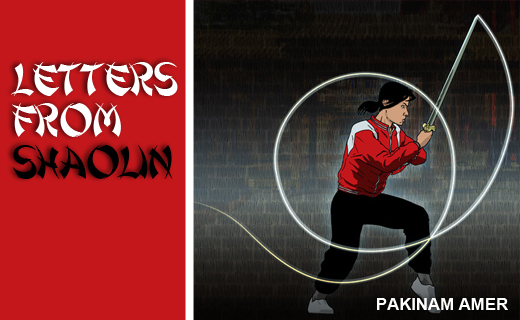The Art of Self-Destruction
Who will save Pakinam Amer from herself, especially know that she knows Kung Fu?

Have you ever felt that your body cannot contain your soul? That your emotions are flowing, flooding you so strongly, that your body is filled up to the brim? That you want out of your own flesh? If you haven’t been through this, then perhaps you can’t possibly imagine it.
This is exactly how I felt like only a week earlier, as I hurried out of the training hall to hide into my room as my eyes welled up with tears. I didn’t want anyone to see.
Why? We were being taught to jerk our bodies off the ground and into a standing position – Kung Fu style – and I couldn’t do it. That was a little more than a week after I moved from Xiaolong, Little Dragon School, to Lao Ta Gou, inside the Shaolin Temple, reputedly the best and toughest Kung Fu school in China.
On that day, Felix, the young German co-teacher —the Shifu’s master disciple and the equivalent of the class captain, seven years my junior— shook his head at my feeble attempts knowingly. “You know what Paky?” he began. “If you don’t wanna do this, don’t. I can see it in your eyes. Your mind is telling you ‘you can’t do it’ so it’s useless.”
I protested a little, “it’s too hard. I think I pulled a muscle. My left leg is hurting,” I said. [And it was].
“Excuses,” the German retorted.
And he followed that with a resigned look of “that’s that,” the one that you give a child who’s refused to do his homework and instead is sitting glued to a TV screen, and is pulling a tantrum every time you try to drag him or her away. In that precise moment, I was torn between hurling him with the nearest bulky object I could get my hands on (or just punching him straight in the face) “for not quite getting how I feel,” and giving in and admitting that he’s absolutely right, so fuckin’ right it bloody hurts.
But you see, for someone like me, a difficult “Kung Fu” pattern or jump, is not just that. It’s not “something new, let’s see if I can make it work.” It’s something old, an old challenge —a question if you will— masquerading in a new form.
And the question is, “Are you good enough? Do you have what it takes? Are you worth it?”
And so every small thing — a new move, an urge I can’t escape, a new person I meet, a new experience— are either manifesting to prove I’m worth it, or I am not. That I’m a success or a complete failure. Every little behavior seems to contribute an answer to that personally existential question.
Can’t do a kick? Nope, sorry, cos you’re not good enough. You don’t have what it takes. A stranger doesn’t warm up to me right away? Sure, cos I’m not good enough, a loser. Why would he or she? And on and so forth.
And it’s so goddamn exhausting.
During training that day, it was the same old question posing as Kung Fu acrobatics.
Right next to where we were training was a large group of teenagers, giggly, care-free and light. I looked at them, and I wondered where life would’ve taken me if as a teen I didn’t live with family conflicts, struggled with depressive episodes and a binge-eating disorder that left me overweight, self-conscious and perhaps even slightly broken. I felt robbed —because of a combination of upbringing, domestic problems, and some of my own country’s backward traditions, destructive habits and limiting expectations— of the lightness that usually comes with being that young and fresh.
Immediately, with these train of thoughts, my mind disengaged. I was in my head. In a very dark place. I excused myself from training. The German co-teacher shook his head again, gave a small smile, the “suit-yourself” kind of smile, and didn’t respond. If I didn’t know he’d probably floor me, I would’ve gone for that punch. Actually, I would’ve made it a double punch, followed by one of those outward kicks I can’t seem to get right.
Why?
Because it feels uncomfortable for someone to figure you out — to glimpse those ghosts in your head, almost, and dismiss them as your responsibility. And I don’t have that toughness, the mental strength, of the athletes, that dictates that ghosts be buried, and the past and everything personal should be left at the door of the training hall. He probably has it … me? well, not yet.
As per tradition, I went straight to my Twitter. The venting machine. I spilled it all out, had a meltdown in broad (virtual) daylight, and again, it felt liberating.
I’m weak, destructive, clueless. Even bloody Shaolin can’t save me. I said it all in so many words. Here world, you thought I was on a grand adventure, doing what you couldn’t do. You’re wrong. I’m not. There’s nothing about me worth admiring. Hear, hear.
After the (virtual) self-immolation, one of the first reactions I got was from a dear friend of my sister’s and me, “You inspire me,” she said. “Especially when you’re strong enough to share your weakness. Much love is always being sent your way.”
I laughed bitterly through the tears. Just a day earlier, I was telling that class captain about how I feel like picking a fight with those who tell me “I inspire them.” It seems so reductionist, simplistic, unfair.
“I struggle with so much,” I said. “When people say I inspire them, it makes me feel mad. It’s insulting. It makes me feel like they don’t understand how much I’m lost sometimes, or don’t know what the hell I’m doing … how much it’s all so difficult, and I haven’t even accomplished half of what I want to. It’s like they’re seeing a different reality.”
“But it’s OK,” Felix said, in his German matter-of-fact this-is-the-truth-take-it-or-leave-it-for-all-I-care tone. “Because may be, it’s not always about you. May be they’re invested in this too. If you succeed in this despite of all what you’re going through, it means they can too. By doing what you’re doing, you’re giving them a chance too. You’re giving them hope. So they want you to succeed, not just for you. But for them.”
Hands down, it was the most profound statement I’ve heard recently.
Joan, my Kung Fu friend from Spain, and I call Felix “the German Buddha” or the “German monk,” and he does have a striking personality, despite his young age, coupled with a brand of compassion and patience I’ve witnessed only in very few people, usually much older than him. It’s the silence, and the profound emptiness shining through him that, in equal measure, spurs awe and the funniest of jokes. Joan and I waver between religiously admiring him, the flawlessness of his “Kung Fu form” and his dedication … to genuinely wondering about the depths of his cluelessness about say, girls or dating, or the rest of the waken world. That last one about dating is pure speculation, since Felix is as private and unreadable as a Russian spy if he so chooses to.

The point? The point is I just realized I’m being self-centered about all this.
I have consciously decided —by blogging, writing a weekly column, tweeting and facebooking about all this— that I’m involving others in this. It’s very personal, yes. But I brought others into it. I’m not a kid, I’m a mass communication expert, and a seasoned journalist. So I should know better regarding what this entails.
If I chose to share this part of myself, does it become solely mine anymore, is it only about me? Or is it, like the German said, about all those who I sold the dream and the experience to? Is it about me or those who I engaged in this, who I convinced that maybe, maybe we can do this together? That maybe this Alice-in-Wonderland adventure can work. That perhaps I can tumble down the rabbit hole and come out wiser.
My friend’s tweet was followed by a flood of others; friends and strangers urging me to be strong, proclaiming in blind faith that they trust my ability to do this, to be what I want to be, to snap out of it and push on, even if I don’t trust myself. They know like they know like they know that I can do it. They put their faith in me.
Several people also said they related, I spoke “out of their heads.” One tweep wrote, “I [save] your tweets in order to remind myself that this isn’t a lonely affliction that no one [else] gets or that I’m damaged because of it.” Another told me that she follows my “adventure” because of my flaws, not the lack thereof.
With some, there was almost a pleading undertone, “please stand up, please do it.”
If I fail myself, I fail them.
And with these loving, supportive tweets, it suddenly hit me … that if I chose to put myself in the spotlight as such, if I chose to give this experience to others and share it with them, then maybe the German monk is right, may be it becomes a responsibility (not a luxury) to do my best, and rise up to my potential … to honor my promise of making this happen in the best way it could.
Not just because I can. But because if I can, I may just give others the chance to “can” to.
And this is priceless.
Because if I —Pakinam— am not good enough, and worth all the effort that I put into this, then perhaps I’m worth it by proxy, because of all those beautiful people standing behind me, hoping against hope that I can make it.
Jin, the South Korean adventurer, daredevil, triathlete and writer, told me once that he’s not a rich man, but by taking risks, doing what others thought impossible, and proving that things look fearful and difficult only because they’re untried, he’s giving people the only thing he can give: his stories. “I can’t give them much, but I can give them my stories. And they’re all I have,” he mused.
Perhaps I can learn from that too. Perhaps all I need to do is to man up, find my strength, brush off all negative thoughts, the past and all its disappointments, so I can tell a good story.
Whatever I failed at today, I will try tomorrow.
Again, and again. Until I get it.
And I will.
- Previous Article I Got Banged!
- Next Article Arabic
























